Shoulder pain can be debilitating, affecting your ability to perform everyday activities and diminishing your quality of life. When conservative treatments fail to provide relief, shoulder arthroscopy might be recommended. This minimally invasive procedure is performed by experienced orthopaedic doctors and shoulder specialists in Mumbai, like Dr. Amyn Rajani, who is renowned for his expertise in this field. In this article, we will explore the benefits of shoulder arthroscopy, what the procedure entails, and address common FAQs to help you make an informed decision.
What is Shoulder Arthroscopy?
Shoulder arthroscopy is a surgical procedure used to diagnose and treat problems inside the shoulder joint. Unlike traditional open surgery, arthroscopy involves small incisions through which a tiny camera (arthroscope) and specialized surgical instruments are inserted. This approach allows the surgeon to view the inside of the shoulder joint on a screen and perform necessary repairs with minimal disruption to surrounding tissues.
Benefits of Shoulder Arthroscopy
- Minimally Invasive: Shoulder arthroscopy involves small incisions, which reduces tissue damage, minimizes scarring, and speeds up recovery compared to open surgery.
- Accurate Diagnosis and Treatment: The arthroscope provides a clear view of the inside of the shoulder joint, allowing the surgeon to accurately diagnose and treat a variety of shoulder conditions, such as rotator cuff tears, labral tears, shoulder impingement, and cartilage damage.
- Reduced Pain and Discomfort: Smaller incisions and less tissue disruption typically result in less postoperative pain and discomfort. Patients often require fewer pain medications and experience a more comfortable recovery.
- Faster Recovery Time: Due to the minimally invasive nature of the procedure, patients can expect a quicker return to normal activities and work. Rehabilitation and physical therapy can also be initiated sooner, aiding in a faster overall recovery.
- Lower Risk of Complications: Arthroscopic surgery carries a lower risk of complications such as infection and blood clots compared to open surgery. The smaller incisions are less prone to infection, and the overall stress on the body is reduced.
- Outpatient Procedure: Many shoulder arthroscopy procedures are performed on an outpatient basis, meaning patients can go home the same day. This convenience reduces hospital stay costs and allows for recovery in the comfort of your own home.
Common Shoulder Conditions Treated with Arthroscopy
- Rotator Cuff Tears: Repairing torn tendons of the rotator cuff.
- Labral Tears: Fixing tears in the cartilage that stabilizes the shoulder joint.
- Impingement Syndrome: Removing inflamed or damaged tissue causing pain.
- Shoulder Instability: Tightening or repairing loose ligaments.
- Frozen Shoulder: Releasing tight joint capsules.
- Arthritis: Cleaning out loose cartilage or inflamed tissue.
The Procedure: What to Expect
Shoulder arthroscopy is typically performed under general anesthesia. Here’s what you can expect during the procedure:
- Preparation: The shoulder area is cleaned and sterilized. Local anesthesia may also be used to numb the area.
- Incisions: The surgeon makes small incisions around the shoulder.
- Insertion of Arthroscope: The arthroscope is inserted through one of the incisions, providing a live video feed of the shoulder joint.
- Diagnosis and Repair: Additional instruments are inserted through other small incisions to repair the identified issues.
- Closure: After the necessary repairs are made, the instruments are removed, and the incisions are closed with sutures or steri-strips.
- Recovery: The patient is moved to a recovery area and monitored before being discharged home.
Postoperative Care and Rehabilitation
Postoperative care is crucial for a successful recovery. Patients are typically advised to:
- Rest and Ice: Use ice packs to reduce swelling and pain.
- Medications: Take prescribed pain medications as needed.
- Physical Therapy: Begin physical therapy exercises to restore movement and strength.
Follow-Up Appointments: Attend scheduled follow-up visits to monitor progress and address any concerns.
FAQs About Shoulder Arthroscopy
Q1: Who is a good candidate for shoulder arthroscopy?
A: Good candidates are individuals with shoulder pain that hasn’t responded to non-surgical treatments, such as physical therapy, medications, or injections. Conditions like rotator cuff tears, labral tears, and impingement syndrome often benefit from this procedure.
Q2: How long is the recovery period after shoulder arthroscopy?
A: Recovery time varies depending on the individual and the extent of the repair. Generally, patients can return to light activities within a few weeks, but full recovery may take several months, especially if extensive repairs were made.
Q3: Will I need physical therapy after the surgery?
A: Yes, physical therapy is a critical component of the recovery process. A tailored rehabilitation program helps restore shoulder function, improve strength, and prevent stiffness.
Q4: Are there any risks associated with shoulder arthroscopy?
A: While complications are rare, they can include infection, nerve injury, or stiffness. However, the minimally invasive nature of the procedure significantly reduces these risks.
Q5: Can shoulder arthroscopy be performed on both shoulders at once?
A: It’s uncommon to perform arthroscopy on both shoulders simultaneously due to the recovery demands. Typically, if both shoulders require surgery, the procedures are staged a few months apart.
Q6: How can I choose the best shoulder specialist in Mumbai?
A: Look for a shoulder specialist with extensive experience in arthroscopic procedures, good patient reviews, and a track record of successful outcomes. Dr. Amyn Rajani, a leading orthopaedic doctor in Mumbai, is highly recommended for his expertise and patient-centric approach.
Q7: What are the costs associated with shoulder arthroscopy in Mumbai?
A: Costs can vary based on the complexity of the procedure, the surgeon’s expertise, and the hospital or clinic where the surgery is performed. It’s best to consult directly with your chosen specialist to get an accurate estimate.
Conclusion
Shoulder arthroscopy offers numerous benefits for those suffering from shoulder pain and dysfunction. With its minimally invasive nature, reduced recovery time, and lower risk of complications, it stands as a superior option for many shoulder conditions. For consulting an experienced shoulder specialist in Mumbai like Dr. Amyn Rajani can provide the relief and recovery needed to return to an active and pain-free life. If you’re experiencing persistent shoulder pain, consider discussing shoulder arthroscopy with a trusted orthopaedic doctor in Mumbai to explore your treatment options.
For more information or to book a consultation with Dr. Amyn Rajani, visit his OAKS clinic at Hughes Road, Mumbai or website www.dramynrajani.com or simply call on Clinic Number 91-88989 75355 / 91-22-23619137 to take the first step towards a pain-free future.




